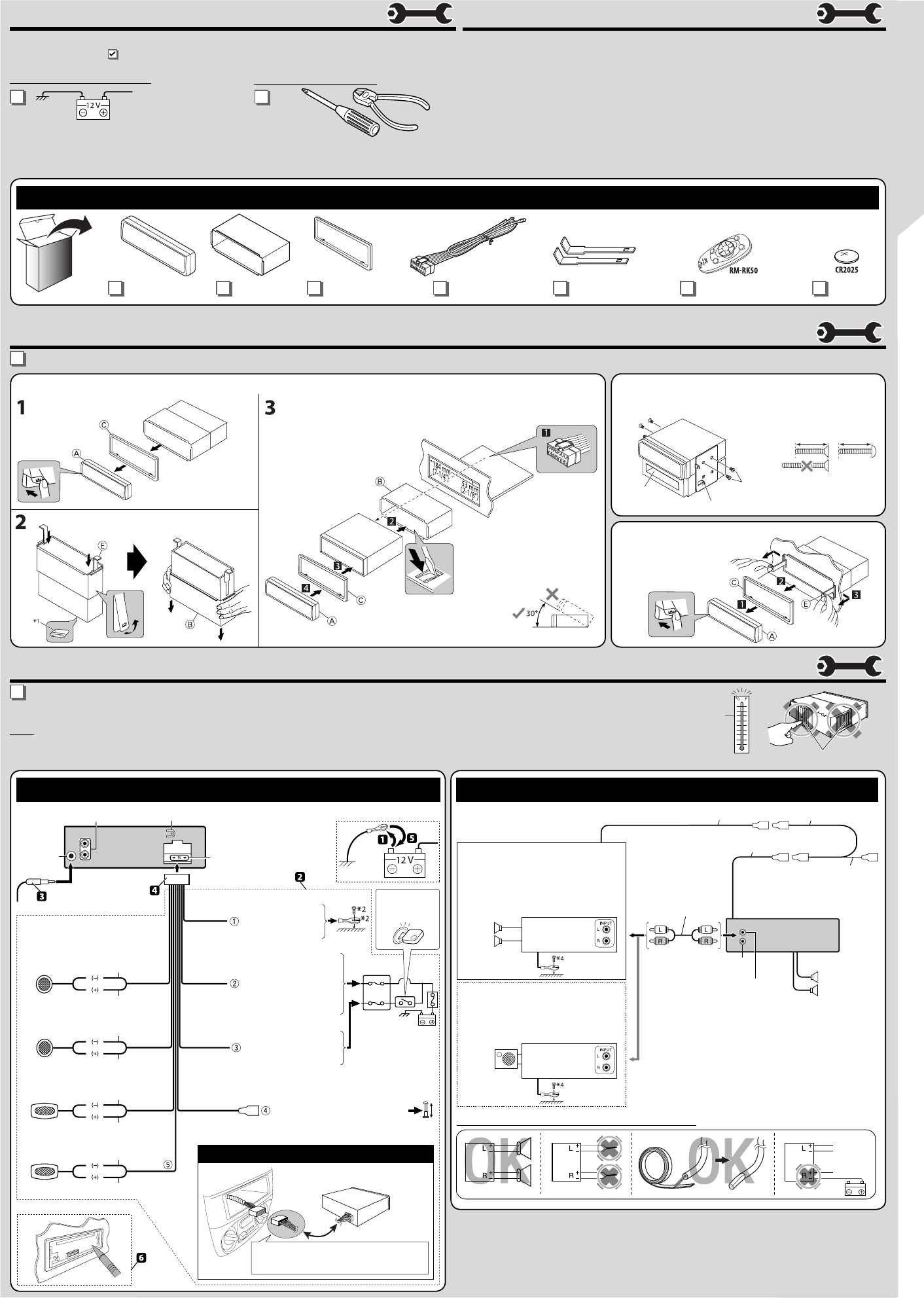
4 – EN
INSTALLATION / CONNECTION
PREPARATION
You need the installation kits which corresponds to your car.
• Mark all the check boxes ( ) to make sure you have follow the instructions and the listed parts.
Check the battery system in your car
Set “L/O MODE” to “WOOFER”
(See “General settings—PSM.”)
You can also connect a subwoofer to the REAR
LINE OUT terminals.
Rear
speakers
Remote lead
Remote lead (blue with white stripe)
To the remote lead of other equipment
or automatic antenna if any
Y-connector *
2
Front speakers
Subwoofer
Set “L/O MODE” to “REAR”
(See “General settings—PSM.”)
You can connect a power amplifier for rear
speakers.
JVC Amplifier
Typical connections Connecting the external amplifier or subwoofer
INSTALLATION
The following illustration shows a typical installation. If you are not sure how to install this unit correctly, contact your JVC car audio dealer or a company supplying kits.
Purple
Front speaker (left)
To the remote lead of other
equipment or automatic antenna if
any (200 mA max.)
Blue with white
stripe
Red
To an accessory terminal in
the fuse block
To a live terminal in the
fuse block connecting to the
car battery (bypassing the
ignition switch) (constant
12 V)
Yellow *
3
To the metallic body
or chassis of the car
Black
Ignition switch
15 A fuse
Fuse block
Rear speaker (left)
Rear speaker (right)
Front speaker (right)
White with black stripe
Rear line out
Rear ground terminal
Antenna
terminal
Gray with black stripe
Green
Gray
Green with black stripe
Purple with black stripe
White
Connect only the front speakers if your
speaker system is two-speaker system.
JVC Amplifier
E HandlesA Control panel B Sleeve C Trim plate D Power cord
Parts list for installation and connection
F Remote controller G Battery
TROUBLESHOOTING
• The fuse blows. ] Are the red and black leads connected correctly?
• Power cannot be turned on. ] Is the yellow lead connected?
• No sound from the speakers. ] Is the speaker output lead short-circuited?
• Sound is distorted. ] Is the speaker output lead grounded? ; Are the “–” terminals of L and R speakers grounded in
common?
• Noise interfere with sounds. ] Is the rear ground terminal connected to the car’s chassis using shorter and thicker
cords?
• This unit becomes hot. ] Is the speaker output lead grounded? ; Are the “–” terminals of L and R speakers
grounded in common?
• This unit does not work at all. ] Have you reset your unit?
or
Left
Right
12 V DC, NEGATIVE ground
Prepare this before installation
See “ELECTRICAL
CONNCECTIONS” below.
*
1
When you stand the unit, be careful not to damage the fuse on the rear.
*
2
Not supplied for this unit.
*
3
Before checking the operation of this unit prior to installation, this lead must be connected, otherwise the power cannot be
turned on.
*
4
Firmly attach the ground wire to the metallic body or to the chassis of the car—to the place uncoated with paint (if coated
with paint, remove the paint before attaching the wire). Failure to do so may cause damage to the unit.
Removing the unit
Release the rear section first...
8 mm (3/8")
Bracket *
2
Pocket
Flat head screws—M5 × 8 mm (3/8") *
2
When installing the unit without using the sleeve
In a Toyota car for example, first remove the car radio and install the unit in
its place.
ELECTRICAL CONNECTIONS
Make sure to disconnect the battery’s negative terminal.
•
Be sure to ground this unit to the car’s chassis again after installation.
Note:
It is recommended to connect to the speakers with maximum power of more than 50 W (both at the rear and at the front, with an impedance of 4 Ω to 8 Ω). If the
maximum power is less than 50 W, change “AMP GAIN” setting to prevent the speakers from being damaged (see “General settings—PSM”).
Heat sink
High
PRECAUTIONS on power supply and speaker connections
Signal cord *
2
IMPORTANT
RECOMMENDED CONNECTION
Custom wiring harness *
2
In-dash mounting
EN_KD-S16[J]f.indd 4EN_KD-S16[J]f.indd 4 7/3/09 9:50:13 AM7/3/09 9:50:13 AM


















